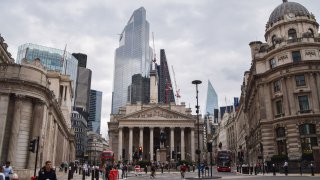
- Policymakers at the BOE voted unanimously to leave its main interest rate unchanged at a record low of 0.1% and opted to stick to its asset purchase target of £875 billion ($1.2 trillion).
- But the case for policy tightening appeared to gain some momentum, as Deputy Governor Dave Ramsden joined Michael Saunders in voting for an early end to the BOE's program of government bond purchases.
- On inflation, the U.K. central bank warned consumer prices were likely to rise to "slightly above" 4% this year, double its target level, owing largely to the deepening energy price shock.
LONDON — The Bank of England on Thursday kept monetary policy unchanged and downgraded economic growth projections for the third quarter of this year.
Policymakers at the BOE voted unanimously to leave its main interest rate unchanged at a record low of 0.1% and opted to stick to its asset purchase target of £875 billion ($1.2 trillion).
But the case for policy tightening appeared to gain some momentum, as Deputy Governor Dave Ramsden joined Michael Saunders in voting for an early end to the BOE's program of government bond purchases.
Get Boston local news, weather forecasts, lifestyle and entertainment stories to your inbox. Sign up for NBC Boston’s newsletters.
The central bank revised down expectations for third-quarter U.K. GDP growth to 2.1% from 2.9% at the time of the August report. This downgrade was said to reflect, in part, "the emergence of some supply constraints on output."
The updated forecast would leave third-quarter GDP around 2.5% below the U.K.'s pre-Covid peak.
On inflation, the BOE warned consumer prices were likely to climb to "slightly above" 4% this year, double its target level, owing largely to the deepening energy price shock.
Money Report
"The material rise in spot and forward wholesale gas prices since the August Report represents an upside risk to the MPC's inflation projection from April 2022," the BOE said in its report.
"Most other indicators of cost pressures have remained elevated. The Committee's central expectation continues to be that current elevated global cost pressures will prove transitory."
The central bank said surging gas prices represent a "significant upside risk" to its inflation forecast, warning inflation could remain above 4% into the second quarter of next year.
The BOE reaffirmed its view that it expects inflation to fall back to close to the 2% target over the medium term.
Sterling traded up 0.6% at $1.3711 shortly after the rate decision, paring losses from earlier in the week.
Economic recovery 'leveling off'
The downgrade comes shortly after U.K. economic growth slowed unexpectedly in July and consumer price inflation saw its largest month-on-month increase since records began in January 1997.
The inflation reading prompted some BOE watchers to bring forward rate hike expectations to early next year, while economists at Bank of America believe the central bank could be pressured into a rate rise as soon as February if inflation pressure persists.
"The Bank is now in wait-and-see mode," Hussain Mehdi, macro and investment strategist at HSBC Asset Management, said in a note.
It is "still providing a signal that tightening will be required in the coming quarters to keep inflation in check, but holding off any immediate action as it assesses near-term developments around Covid, the ending of furlough, and the persistence of supply-side disruptions including the recent spike in gas prices," Mehdi said.
The U.K. economy expanded by just 0.1% in July from a month earlier, according to data from the Office of National Statistics. It was the sixth consecutive month of growth amid the removal of Covid-19 restrictions, but the increase was significantly lower than expected and much slower than the previous month, which saw a 1% rise.
The ONS said the U.K. economy remains 2.1% below its pre-Covid pandemic level.
The figures prompted BOE Governor Andrew Bailey to suggest Britain was seeing "some leveling off" of the economic recovery from the coronavirus pandemic.
Speaking to lawmakers earlier this month, Bailey reaffirmed his view that a recent jump in inflation would not prove to be persistent.
The U.K.'s consumer price index surged by 3.2% in the 12 months to August, according to data compiled by the ONS last week. A Reuters poll had predicted a reading of 2.9% for August.
The index rose 2.0% in July on an annual basis.






